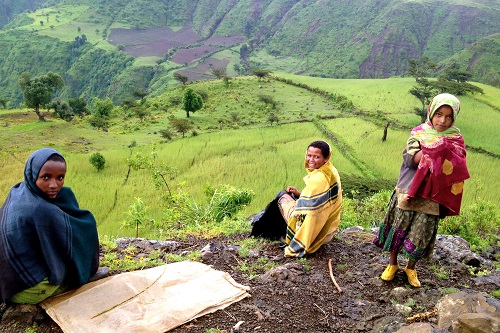CC photo
By
Abebe Wolde Giorgis
For a country in which the main stay of the economy is agriculture, land is a valuable asset which needs efficient utilization. With the combination of human resources and capital, land can be used as a source of wealth creation. In spite of these, within the Ethiopian context the tenure system denies the transaction value of the land because the constitution clearly declares that land belongs to the government. This implies that the absence of sense of ownership on the part of the farmers inhibits them not to venture into long term investment in their land.
The utilization of land is characterized by its suitability, type and where it is located. More and more the physical and climatic situation determines the value of the land.
Dr Yitebitu Mogose is working in the Commission of Environment, Forest and Climate Change Land Degradation and Emission Reduction as program coordinator. According to him, even though the nation prepared some legal framework regarding land utilization, it has no working land policy and plan and because of this land is not economically utilized.
In addition, such a situation hampers effective forest development. He further said that the absence of clear policy and lack of a road map for land management hampers systematic land utilization.
The Urban Land Development and management head at the Ministry of Urban Development Bizualem Admassu on his part said that the absence of a land utilization plan forces urban centers to expand arbitrarily in line with the stretch of road infrastructure, hence to address the problem urban centers should be developed based on viable policy and instruction.
Dr Tesfaye Shimbir is working at the Ethiopian Agricultural Research Institute as a Director of the Land and Water Resource Department and according to him, due to lack of policy and functioning plan, farm lands are utilized for urban development. Land that can be utilized for forest development is utilized for agriculture and mining lands are used for other purposes. As a result, resources are being misused hence planning and implementing a new land policy should be an urgent task. He further said that sorting out lands based on the ecosystem and climate condition is helpful for identifying places which are suitable for urban development, mining, tourism and other purposes. According to Tesfaye, currently the implementation of land usage in each region lacks coherence and uniformity, this having its own unwanted consequences.
The non-availability of functioning policy disrupts the ecosystem and the environment which damages animal and plant life. It is also responsible for the occurrence of climate change drought, land degradation and the reduction of agricultural productivity. Ato Billigne Deresse works at Hawassa University as geography instructor and according to him, land and water pollution currently observed in every area is directly or indirectly related to the absence of a modern land management system. Industries drain their waste to water bodies and farmers lose their lands due to the unplanned expansion of urban centers exacerbated by illegal land invasion, further complicating the matter. The arbitrary usage of land antagonizes the fair distribution of wealth, as a result of which income between the haves and have nots becoming wider, bringing social tension, the urgent implementation of viable policy therefore being essential.
The Ethiopian Constitution clearly indicates that land is owned by the people, giving the government an important role in land management and administration. In urban areas, local governments act as the sole suppliers of land, currently through two means; direct allocation and auction. Until 2011, allocation through direct negotiations also existed.
According to a recent World Bank study, despite recent auctions in all cities there was a clear high unmet demand for residential commercial, industrial land and land management practices resulting in insufficiently serviced land for people, businesses and public, such shortages further exacerbated by rapid urban growth.
Land supply mechanisms which rely heavily on allocation have not been able to meet the demand. In other causes, cities are expanding outward faster than the population growth. This has the potential to further increase the cost of infrastructure and service delivery and is also driving informal slum areas particularly in the urban suburbs. The outward expansion of cities is driven by lack of market pricing, substandard residential houses flourishing as a result and uneconomical utilization of land becoming rampant.
The expansion of slum areas in addition to bringing negative economic consequence, brings unacceptable environmental devastation and social tension. Residents in these areas leave their dry and liquid waste arbitrarily which makes waste management work very complex and hard and consequently makes the area a hot bed of epidemic diseases. As a result, to manage the problem, local governments are forced to allocate additional money for curbing the epidemic. The burning of dry waste also causes hazardous chemicals to be emitted to the atmosphere which poses a threat to climate change and global warming.
The draining of solid and liquid waste to water bodies in the surrounding areas affects water sanitation and water animals, consequently the ecosystem is disturbed and its economic value degraded. In the case of Addis Ababa, historically most settlements took place in an unplanned manner and most small industries, garages, hospitals and latrines are established in the nearby river basins and drain their waste towards the rivers and incur an .unwanted burden to the environment. These all indicate how unplanned and inefficient utilization of land brings negative consequences economically, socially and environmentally. Hence identifying areas to the specific objectives such as agriculture, residence, real estate development parks, social services and industries and proper allocation must be taken as a way out.
The inefficient urban land constraints hampers economic development and investment. Several neighboring countries; Tanzania, Uganda, and Kenya and other countries such as Zambia, Mozambique – which has a public land ownership regime, and South Africa have better land access conditions for firms, which contributes to their competitiveness.
In summary, land is a precious economic resource which can serve as a basis for wealth creation but unless it is used economically in a planned manner it might be abused, hence for proper land management and usage, the pertinent institutions must work diligently.
Abebe Wolde Giorgis
Abebe Wolde Giorgis was born in Harar, Ethiopia. He has a B.A from Addis Ababa University in English Language and Literature, Minor History.
For 17 years he has been a Journalist in local and International Media, Amharic and also an English Newspaper.He wrote several articles on environment and economics.
Member of Environment journalist association, he was deputy editor in chief of an Amharic Newspaper and Senior Editor of the Ethiopian Herald.



No Comments Yet!
You can be first to comment this post!